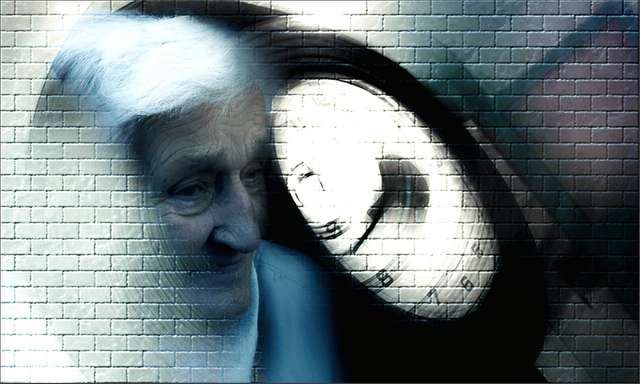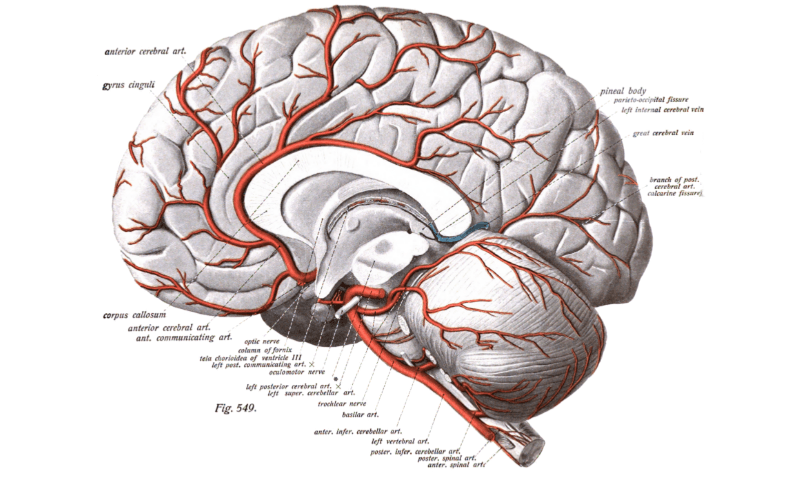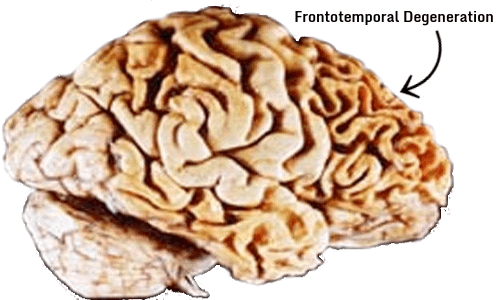Psychology Addict # 32 |Vascular, Frontotemporal & Alzheimer’s Dementia – A Brief Discussion.

A few weeks ago I was on the SteemStem discord channel chatting with @saho, and his post about Mood disorders came up. This, in turn, prompted the interest of another fellow steemian whose dad has been diagnosed with vascular dementia. Coincidentally, that week, I had been reading about dementias and soon understood why that fellow steemian was keen to get more information on the subject.
You see, people living with vascular dementia are prone to react with excessive emotion to minor things and to experience mood swings. These emotions are something that, in some individuals, can even be conveyed through physical violence. Other possible symptoms of vascular dementia are delusions and hallucinations; which inevitably reminds me of my grandmother, who weeks before her death (at 82) reported seeing “a little boy running around the house”. Granny died less than two months after she started talking about the little boy and, other than hallucinations, she did not display any of the other characteristic signs and symptoms of vascular dementia, which contrarily to Alzheimer’s dementia (AD) generally has a sudden onset often following a stroke.
Some of other signs and symptoms are:
- Difficulties with concentration & communication
- Cognitive impairment, such as memory loss
- Epileptic seizures
- Symptoms of stroke, for example: paralysis of an arm
- Getting lost
- Symptoms of depression
An important thing to keep in mind here is that signs and symptoms will vary from person to person, because in this sort of dementia this is dependent on what area of the brain has been damaged.

But, what is Vascular Dementia?
Well, dementia is related to neurodegenaration and changes in brain function. Therefore, it is regarded to be a disorder of the brain. So, in vascular dementia this is a result of poor (or interrupted) blood supply to the brain. As you know, blood carries nutrients and oxygen, elements that neurons cannot function properly without. This lack of oxygen and nutrients will eventually cause the progressive death of brain cells, which may prompt the onset of vascular dementia.
What are the risk factors for vascular dementia?
The same as those for heart disease and stroke: smoking, diabetes, atherosclerosis, high-blood pressure and so forth.
Here, the only box my grandmother would have ticked was the smoking one, which she did for most of her life. Still, if I continue to speculate that her hallucinations were indeed a symptom of vascular dementia what might have happened to her was the onset of a progressive decline of both her cognitive and non-cognitive functions as a result of mini-strokes that were so small that the symptoms either went unnoticed or were temporary (a multi-infarct dementia).
Another possibility, of course, is that the naughty little boy she often saw running around was a real ghost 😲

Frontotemporal Dementia
Frontotemporal dementia is a very tricky disorder to be diagnosed, and this is mainly due to its early onset. Most cases of dementia are seen in individuals at the age of, or older than 65 years, but the onset of frontotemporal dementia can be even seen in people in their 50’s. Further, the fact that its first symptoms are mainly showed through non-cognitive functions makes it even harder for an early diagnosis to take place.
The reason for this is because neurodegeneration in this case happens in the frontal cortex to begin with, to then progress to the temporal cortex (in AD this happens the other way round). This is really delicate because the frontal lobe is where our personality “lives”, it is where our emotions are controlled and also managed.
So, what happens when the frontal lobe begins to show neurodegeneration and atrophy?
Bill’s Case
Bill was 55 years-old when at a BBQ in a friend’s house he got really upset with a young boy and pushed him against a wall. This was something completely out of his character and it was also the last episode that finally made his wife to seek medical help for him. Prior to that incident, for the past few months Bill had forgotten to go to dinners, meetings, dentist appointments, and on one occasion he burst in tears when his grandchild started to cry in his arms.
From those months onwards Bill just became more and more reclusive, he lacked emotions and found it impossible to relate to his family and friends. Also, every other time his children came over to visit him, he behaved in a rather coarse and disinhibited manner.
Bill is likely to live 10 to 15 years counting from the onset of his disease (which is pretty much impossible to say precisely when). Throughout those years it is expected his personality will radically change, that he will not be able to recognise people as well as things, and that his speech will become impaired.
Causes
This is a rare disorder. 50% of frontotemporal dementia cases are inherited and result from a chromosomal mutation in the gene that makes a protein involved in the normal functioning of neurons - tau protein (the abnormal formation of this protein is also one of the three characteristic pathological brain changes in Alzheimer’s dementia). As for those who do not display such genetic changes, like Bill, the cause of the disorder remains unknown.
Next, we are going to briefly discuss Alzheimer’s dementia, the most frequent type of dementia, and a disorder that I saw developing in very different ways: one through the experience a colleague of mine (Clara) went through with her grandmother, and the other through witnessing how it progressed on my friend’s mother, who, here, we are going to call Mrs. Molly.

Alzheimer’s Dementia – Mrs. Molly & Clara’s granny
The last time I visited Mrs. Molly was in 2013, a few weeks before her 92nd birthday and three months before her death. As soon as I arrived she smilingly looked at me and said “hello my dear, did you bring my dress and called the driver? I am a millionaire, you know?” I smiled and handed to her a 50 piece-puzzle. Off she went to the garden where her daughter showed her what to do with the puzzle; which, while chomping on an apple she half assembled and half played with for the next hour. Meanwhile, she would not stop laughing and talking to herself, while her daughter and I caught up with things.
Mrs. Molly’s scenario however was much, much different from that of Clara’s grandmother who became hostile, depressive, lost her ability to control her bowels and bladder and needed help during meals. This is because the way dementia progresses vary from one person to the next, as I mentioned before. However, there were indeed some symptoms they had in common: they both had trouble sleeping, lost awareness of time and place, lost their sense of self, and became estranged to their family members and close friends.
When Mrs. Molly smiled at me and asked me those questions, she had no idea who I was, in the same way she, for nearly 2 years, had no idea who her loving, full-time carer daughter was. Oh! Mrs. Molly had never been a millionaire.

What happened to Mrs. Molly’s and Clara’s grandmother’s brain for them to become like that?
This is a rather complex process, which very briefly described could be seen as a web of interplaying factors involving:
- The formation of plaques due to the presence of the longer version of the β-amyloid peptide, which when not removed effectively has the tendency to form clumps between brain cells.
- The formation of tangles by a hyperphosphorylated form of tau. Tau is a protein that binds to microtubules in neuronal axons. But, tau containing many phosphate groups attached to it cannot bind to microtubules effectively. This of course prevents the normal function of the neuron which will subsequently die.
- Severe loss of brain volume (due to neuron death).
The three processes mentioned above begin to take place in the hippocampus and medial temporal lobes. As you can see, this is why people with AD suffer from memory impairment, because those are regions of the brain that play an important role in consolidating (declarative) memories.
What Causes AD?
With regard to genetic factors it is believed that there are a few genes that contribute to the likelihood of developing AD (this is late onset AD, by the way - the kind of Alzheimer’s that appears after the age of 65). However, there is one particular gene that is seen as a potential risk for AD: the gene that produces the protein apolipoprotein E - ApoE. Individuals with the gene that produces the ApoE4 variant, when compared to the rest of the population, are at a higher risk of developing late onset AD.
Nevertheless, it is very important to keep in mind that the development of AD depends on the interaction of environmental, health and genetic factors. It is also important to have the understanding that old age does NOT necessarily come with AD, or any other type of dementia, for that matter.
And this is when the inevitable question arises:

My 78 year-old uncle is forgetful
Uncle Joseph forgets to take his medication, forgets to water his wife’s flowers, forgets where he put the invitation that the postman delivered. Gosh, the list goes on. That makes auntie T. absolutely mad; but then, she gets worried.
‘Abi, does Joseph have dementia?’
Naah ... look at the things uncle Joseph forgets! On the other hand, he doesn’t forget when his favourite football team’s game is on, or when his pension is going to be deposited in his bank account. More importantly, uncle Joseph can still make rational decisions, he still retains his social manners, and except when his football team is on a losing streak his mood is pretty stable. He is also constantly aware of who he is, who his family members are as well as his acquaintances.
What he has is normal age-related memory decline and a very sweet wife!
To learn more about the normal decline that aging brings to our cognitive functions, please take a look at @dysfunctional’s latest post: Understanding Brain Aging.
Early Diagnosis
Still, just in case there is an elderly family member of yours who, besides a certain level of memory loss, is also behaving out of character, losing awareness of where they are, or of time (day, month, year), it is important to have them examined by a clinician.
To screen individuals for dementia clinicians normally rely on the MMSE , the CDR and the FAST. An early diagnosis can sometimes delay the progress of this disease. Individuals diagnosed with AD can live for up to 10 years, a period which their cognitive abilities will progressively decline.
Prevention
You will be surprised to learn how simple it is to adopt measures that can help prevent the development of the types of dementias we discussed here:
- Adopt some form of intellectual activity – active reading, creative writing (hellooo, Steemit!)
- Reduce the amount of sugary/processed foods in your diet. There is evidence that Alzheimer’s represents a form of diabetes, in some medical circles it is even referred to as Diabetes Type 3 – this is material for a post on its own!
- Move that body – get up, tidy up your surroundings, go for a walk, dance with the children (and the husband), go for a bike ride, to the gym.
- Practice mindfulness – engage with the present moment, accept both your happy and sad moments, remain aware of what is around you, breath in .... breath out.
- Keep on learning new things – a new recipe, drawing, how to cultivate herbs, and make sure you share it with us here on Steemit.
So, which one of the measures listed above are you implementing on your daily routine? I don’t mean to show off or anything like that, but except mindfulness, I follow all the others 😎
Reference List:
Cavalieri, M. Enzinger, C., Petrovic, K., Pluta-Fuerst, A. Homayoon, N., Schmidt, H. et al. (2010) ‘Vascular dementia and Alzheimer’s dementia – are in a dead end road?, Neurodegenerative diseases, vol. 7, nos 1-3, pp. 122-6.
Innes, A. (2009) Dementia Studies, London, SAGE Publications Ltd.
Klein, W.L (2006) ‘Synaptic targeting by AB oligomers (ADDLS) as a basis for memory loss in early Alzheimer’s disease, Alzheimer’s & Dementia, vol. 2, pp. 43 -55.
Image source – Pixabay & Winkimedia: 1, 2, 3, 4, 5, 6


Dear Reader,
It has been a month since I last posted on my blog, and this is because I am struggling a little to deal with all the things I have going on at the moment. 😅 My routine will only get back to normal towards the end of May, when I will be back posting on a weekly basis. I am very much looking forward to that time.
I would like to thank each one of you who has left me comments and messages asking after me. You are just too kind ❤
I hope this post has enlightened you a little about this topic. And because I know this isn’t a topic that is often discussed, I would love to hear what you have learnt here about dementia. I will slowly, but surely, reply to your comments over the coming weeks.
Thank you so very much for taking the time to read my long post.
I wish you all a wonderful weekend! 😊
Hi @abigail-dantes I am so glad and moved you did this post (and what a great post it is).
I did have a fairly lengthy reply on this but elected to not post it out of respect to my other family members, but would be happy to DM you some notes on discord if you wish. It would also allow me to expand on it, but would take a few days to write if that's OK?
I will say when my father, who was diagnosed with vascular dementia 2 years ago, got the care he needed he showed a large amount of improvement, not just in mind, but in body.
Oh @terrylovejoy,
How wonderful to see you here! Please, feel free to DM me. It is my pleasure.
Thank you so much for stopping by 😊
I sometimes wonder if the afterlife was fashioned after things like that, or at least influenced by. My dad was also having hallucinations a couple months before he died, but there was no dementia that we knew of. Perhaps he was just confusing dreams with reality.
The "My 78 year-old uncle is forgetful" section was a nice addition. WebMD should employ a person like you!
Glad to see you back in action btw!
Oh! Thank you for your kind, kind words @alexander.alexis. It means a lot coming from you :)
All the best to you always.
Amazing :) , thanks alot :)
Hello Abigail! What you told us about gives another reason to be more attentive to our close people. My parents are retired, my father loves active rest and fishing, my mother likes to work in the garden. They sometimes do hard physical work for their age and I worry about it. You showed me this situation from the other side. For older people, it is very important to be toned and not to relax.
Thank you for your useful information.
This is such a beautiful thing for you to say @nsbachurin :)
It looks like your parents are doing the right thing. Being physically and mentally active it is good for the general health of not only older people, but of young people too!
Thank you for your nice comment. It means a lot to me :)
Hello @ abigail-dantes, it's a good thing that you've returned, this topic reminds me of my grandmother, who was sick and forgot things, had difficulty to domir, and suddenly changed her mood, I guess she had some kind of dementia, I really do not know, I never took a specialist for that cause, what I do know is that the care that should be taken with these people is unique.
for example, the issue of frontotemporal dementia can be particularly difficult for caregivers because, unlike other forms of dementia, it can affect younger individuals who still work or have children living in their homes. This disease can affect the ability to make decisions very early, so it is important that people start making legal and financial decisions very soon after the disease is present. In addition to fixing power of indeterminate duration, caregivers should also consider a driver's evaluation for their loved ones, before driving becomes a problem.
Caregivers should encourage their loved ones to participate in support groups for individuals with frontotemporal dementia, either in person or online. These interactions can be an important way to deal with a disease that others often do not understand.
It is a bit comforting to know that if it is diagnosed early, the disease can be delayed a little as well as the prevention that we must have so as not to suffer it, for example in the case of food, we are very disordered, we do not comply with a balanced diet and in as many movements we lead very sedentary lives, we do not practice any sport because the life so accelerated that we have in these times does not allow it.
Thank you very much abigail, continue with your high quality post, I hope you soon.
Dear @urbano579,
I am very impressed by your deep reflection and understanding of the post! I also appreciate very much that you even related it to your granny.
All the observations you made here about cases of early onset dementia - as it happens in frontotemporal cases - are very important. But, also overwhelming. Dementia is an under diagnosed disease, and this is because not much is discussed about it.
Thank you so very much for your most incredible feedback. It means a lot to me!
All the best to you :D
Wow! Abbey is back.
I've heard about dementia but never seen it in so much details like this.
In the prevention you gave, this particular statement got me
I never knew blogging is actually good medically.
Nice piece ma'am
Oh yes, it is one of the best because you get to use your brain intensively. I would say it's much better than just reading because you also activate your speech centers. When testing for brain activity levels, the people having the most active zones in their brains were the ones playing strategy games and computer managerial simulators, followed by creative writers. I don't remember what study was that but I could try to find it again.
Wow! This is so cool. Thanks
Sammmyyyy 😊
Until June I am only partially back!
Yep, writing is very, very good to get those brain networks all fired up !
Lots of love to you my dear :*
Wow! I guess my brain network must have been fired up by writing :)
Lots of love ma'am
She is back
Yay! @abigail-dantes is back!!
I've been looking forward to reading your next post! I can understand that you might have just too much going on with life right now! Glad you're back and looking forward to reading from you on a daily basis in six weeks from now or so!
I'm really glad to see you taking the chance to raise awareness regarding vascular dementia. I think most people know little to nothing about this condition. I also loved the fact that you shared information concerning the possible causes as well as tips for prevention.
Matter of fact this was a simplified, enjoyable piece which included quality information.
Thank you so much for your efforts!
Stay awesome!
Hey @lordneroo ❤
Thank you so much for stopping by and leaving such a nice comment. It pleases me very much to hear you found this piece enjoyable and straight-forward. I still have to work on keeping my writing concise, though 😅
One day I will get there!
Take care :)
So happy to read again an informative post from you ms. @abigail-dantes
😁😁😁 maybe I should ask my mom to join us here on steemit...
Most of my grandparents had dementia. 😔😔😔
I think I can do this but drawing... i can only draw flower with 5 petals... 😁😁😁
This is a great informative post thank you for this now I have measures that I can follow to prevent dementia And I can also share this to my loved ones especially my parents...
Thank you ms. Abi on your big support to us and I wish everything will be fine so you can be back on you regular blogging ...
Much Love,
A V H Y 😘😘😘
I am happy to see you have not forgotten me my dear :D
Considering your grandparents had dementia, it is even more important for your mum (and you too) to always keep active, both physically and mentally!
It looks like we are both very 'talented' at drawing 😅
Much love to you too from Portugal! 😘
Thank you ms. Abi...😊😊😘❤️
My grandfather passed away when I was little. But as I remembered during the first time I met him he couldnt recognize me at all though my father kept on telling him that I'm his granddaughter. And according to my cousins and close relatives he was totally helpless. He needs to be taken cared of all the time. During meal time,taking baths and sleeping. He also had a hard time controlling his bowels and bladder. He was suffering from AD at that time and though I might not understand what's happening to my grandpa I always knew that he was suffering from AD.
I'm glad I get to read your amazing post once again dear. As I have mentioned on my own blog I missed you and your great articles @abigail-dantes. Im happy that youre back and you are once again fascinate us with your psychology articles. It really is important that we are knowledgeable with AD so as to understand what the older people are suffering from & of course so that we can help them. I hope you are still doing well there in Portugal.
I am sorry to hear about your grandpa @sakura1012, it is always heart-breaking to see someone living with dementia going through those stages. Even more so when is a loved one! The comforting thing, from the perspective of the patient, is that their lack of awareness frees them from feeling ashamed.
Thank you so very much my dear for your invaluable and constant support! Your loving words and comments always motivate me and make me smile. I am doing well over here, but just have a lot on my plate at the moment!
You take care and keep on with that beautiful work of yours. You have come a long way Sakura. I am SO very proud of you and will never get tired of saying so 😍
I totally understand how busy you are & look at the number of people who misses you. You are loved dear by everyone including me. 😊 Always remember that you are my number 1 inspiration here in the platform and you will always got my back. 🌸
First off: I told you u'd be coming back. :P
Second: Dementia is the dread of almost everyone I speak with about getting older. Most of us don't fear death as much as we fear losing our wits.
That said, I had no idea there were other forms of dementia than AD. So your post was very interesting to read, thank you.
Oh! So glad to hear you found some new information here @sco 😊 Dementia is a frightening thing indeed, even more so when one comes across people living with it. I suppose that the good news is that we don't have to feel doomed as there are simple actions we can take to, if not prevent it altogether, at least delay it!
All the best my dear.
Take care :)
ohhh my dear @ abigail-dantes you finally came back to offer us these interesting and important topics. sadly I am going through a similar case with my mother: (since she suffers from mental disorders such as schizophrenia, hallucinations and delusions.) It has been very hard for the family since they are several years trying to cope with their illness without losing patience. It is strong because we must understand that the things to which she refers are a reality very different from ours and there is no one to make her think otherwise, nowadays it is difficult or almost impossible to keep her under treatment because of the serious situation in the country. in the economic, political and social aspect that we are going through, which leads to the high cost of medicines and the inexistence in pharmacies.It helped your post because I like to learn every day and I like the theme.
Thank you very much for that. regards!!! come back soon :))
Oh my God dear @rosnely, I am sorry to hear about your mum. I cannot imagine how hard and draining this must be for you and your family. But, you are so right when you say that her reality is different from yours. You have my most profound respect for dealing with this situation under the circumstances Venezuela is in. I send you, your mum and your family all my love from Portugal :)
thank you for your words my dear friend @ abigail-dantes and if it is a very difficult situation that gives me sadness and frustration of not being able to continue your medication as they are not available and if there are very expensive, you would need at least 5 minimum salaries to be able to buy the medicine for a month. : (( and if I am honest this means helps me to be able to save for the purchase of the medicine. and grateful to you for your help, be it intellectual and with your voting support.